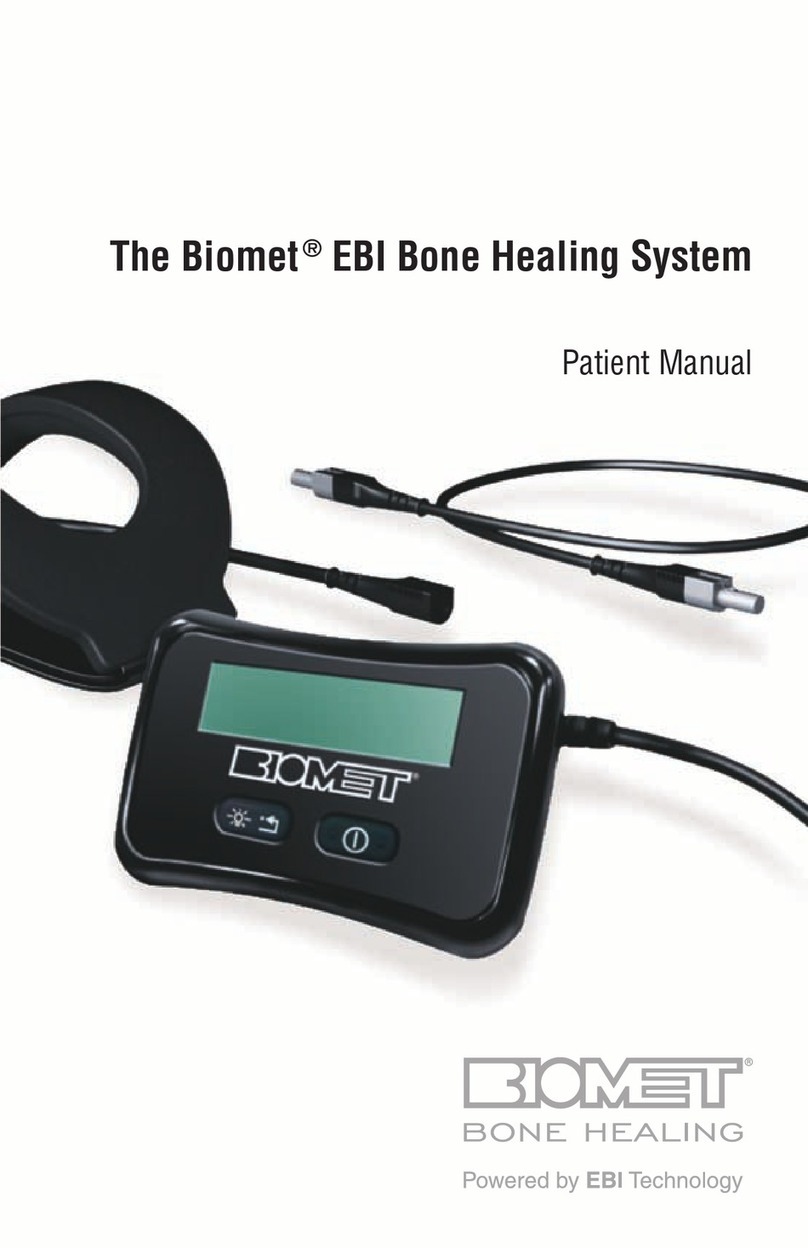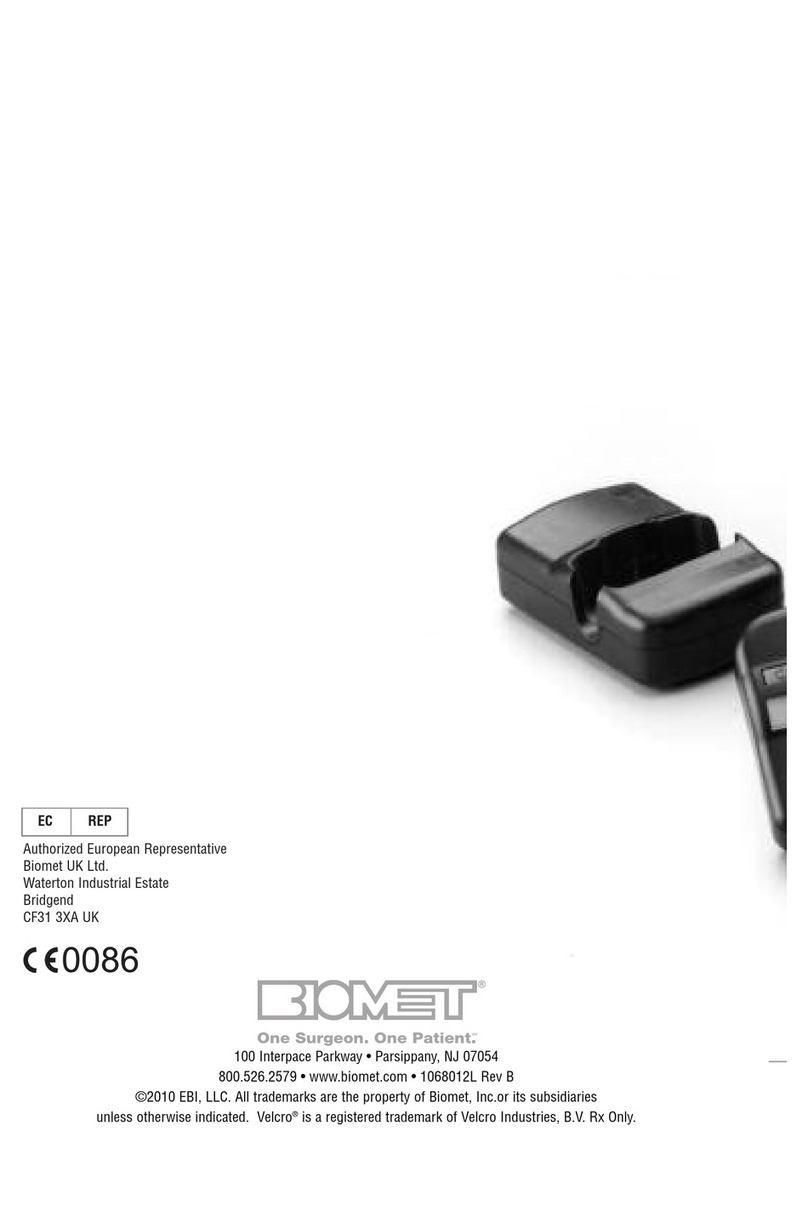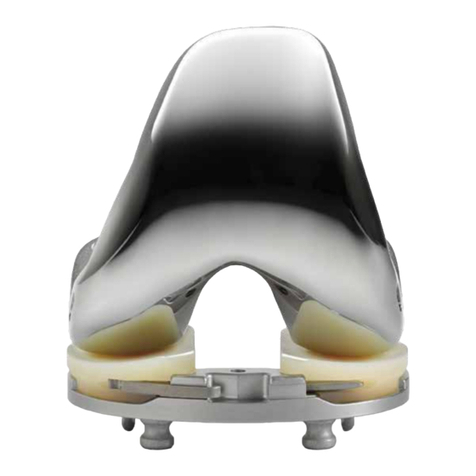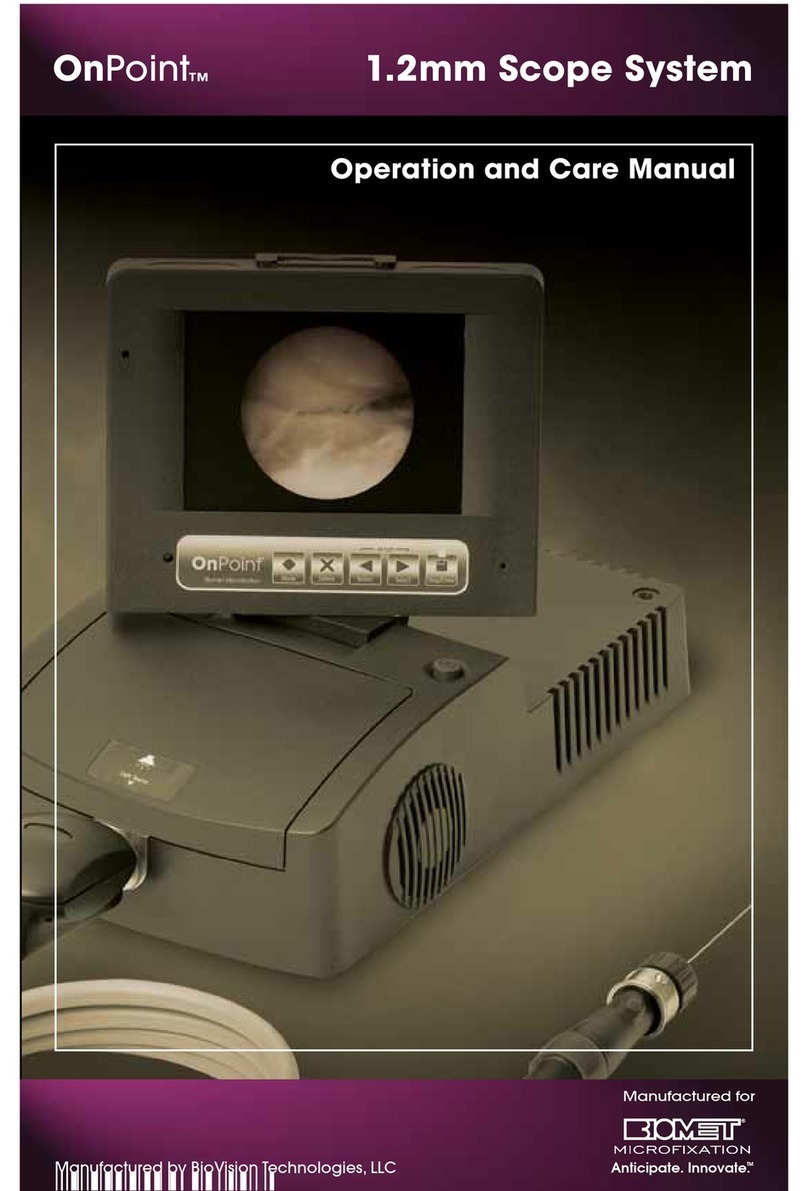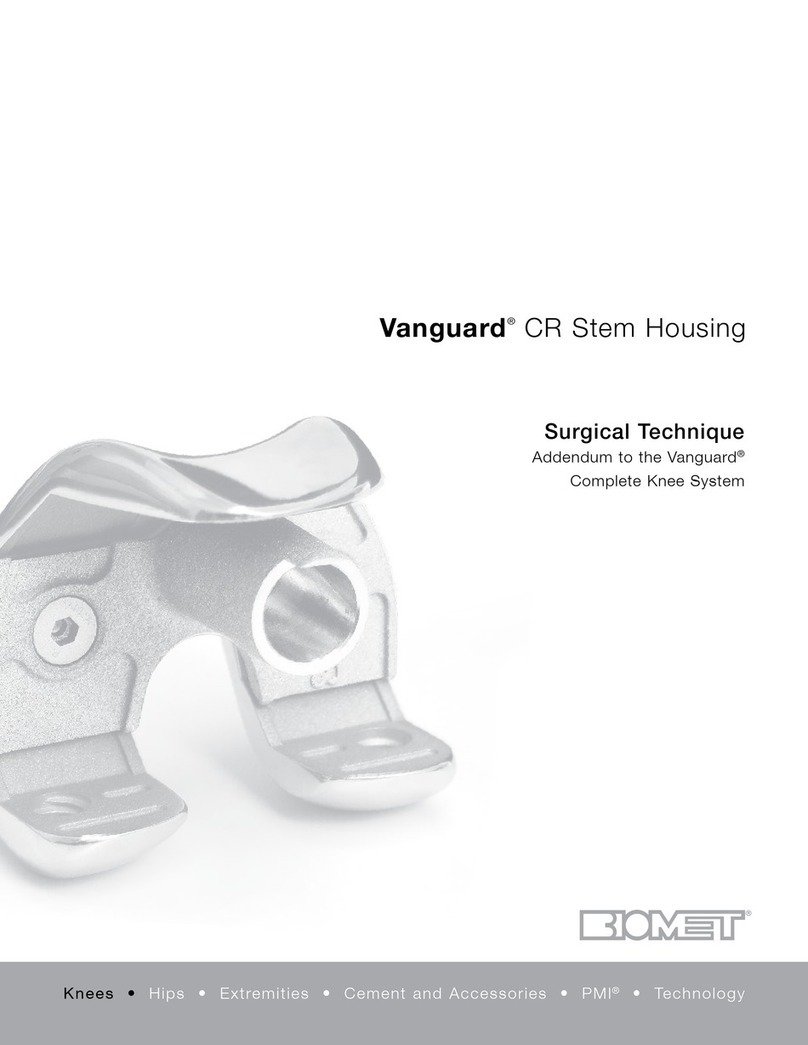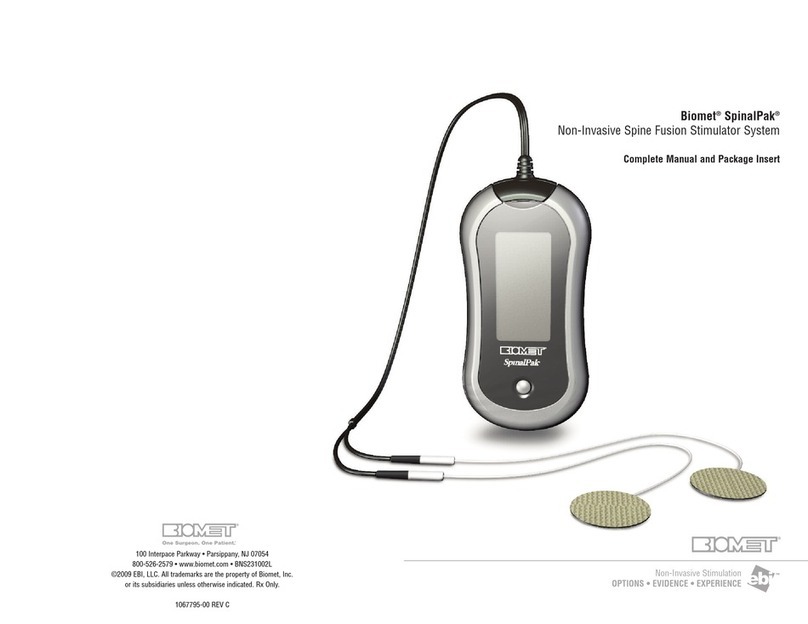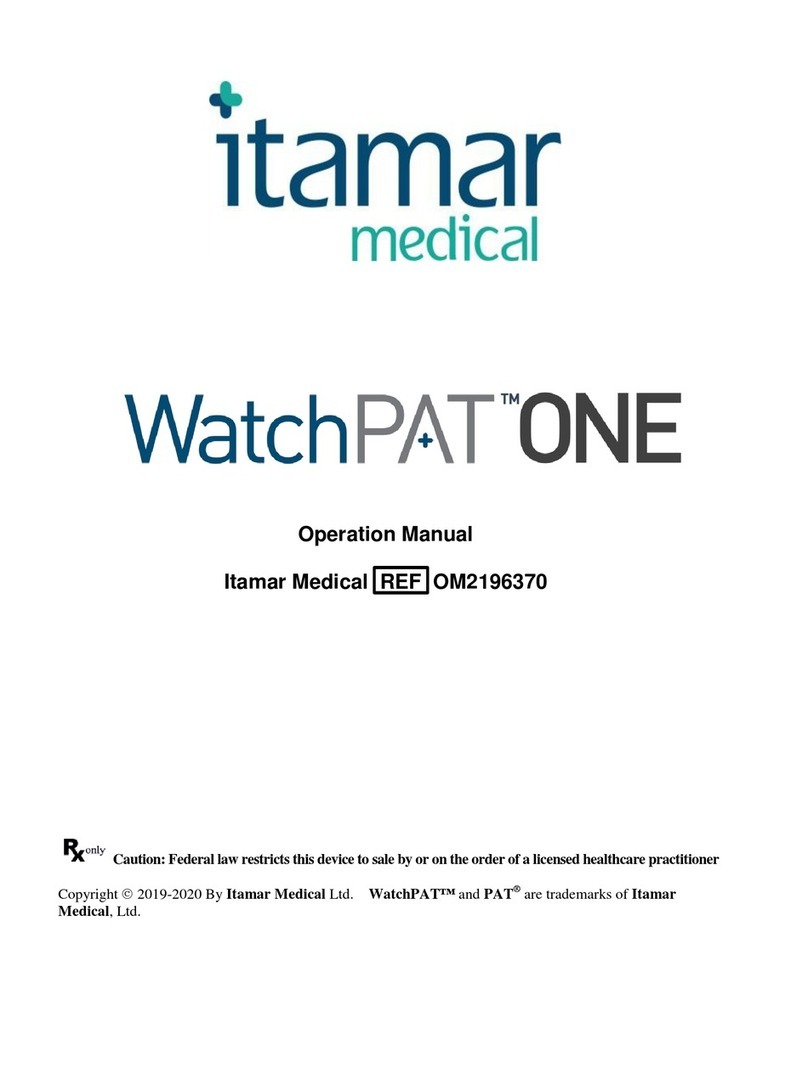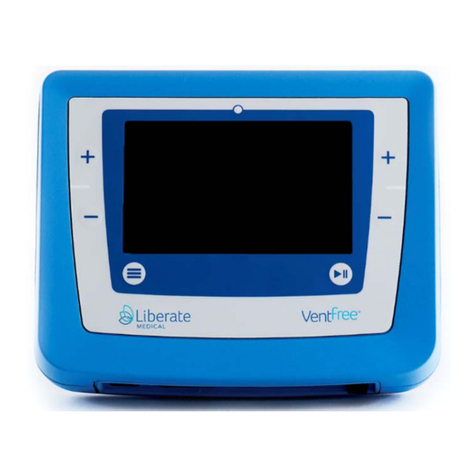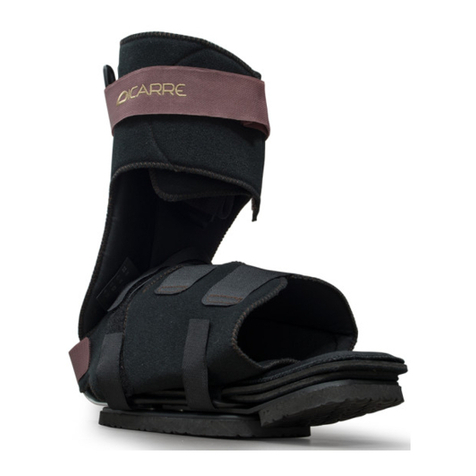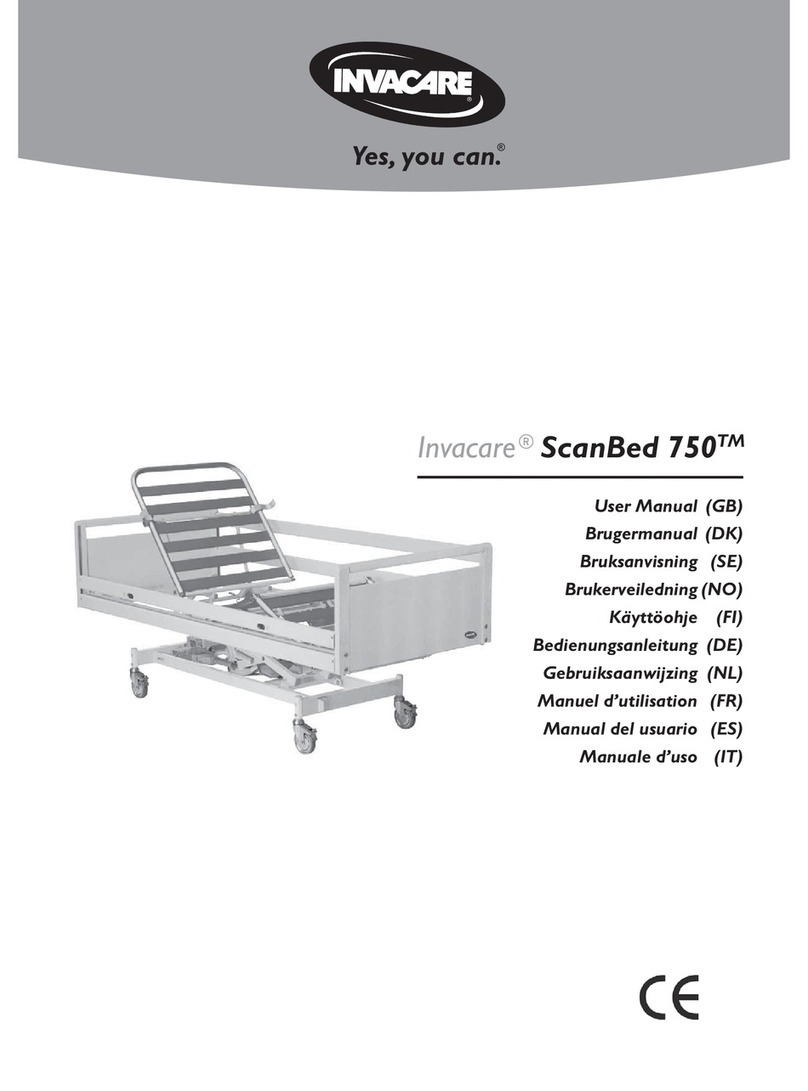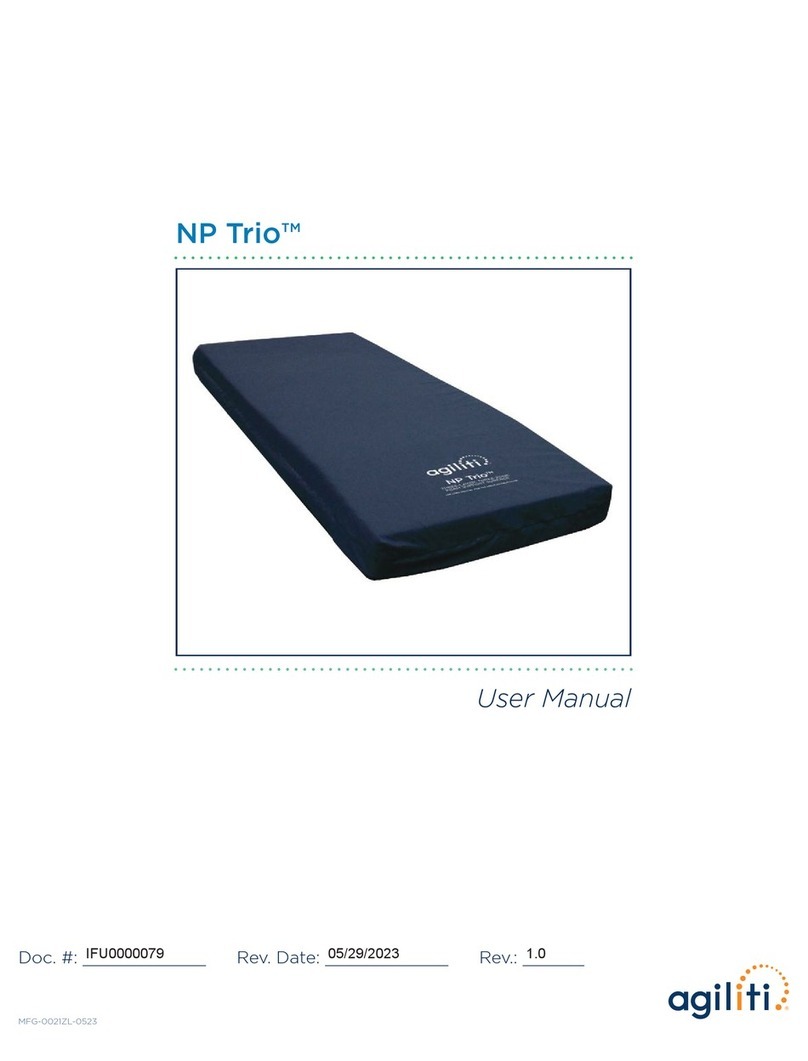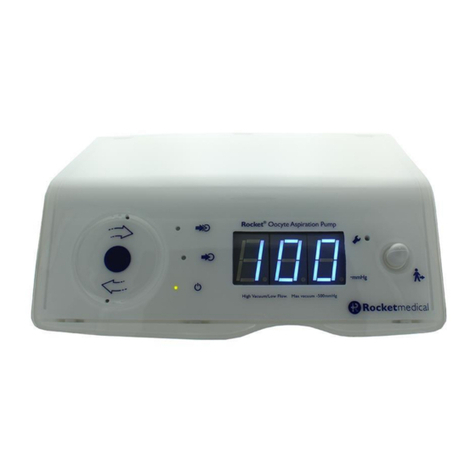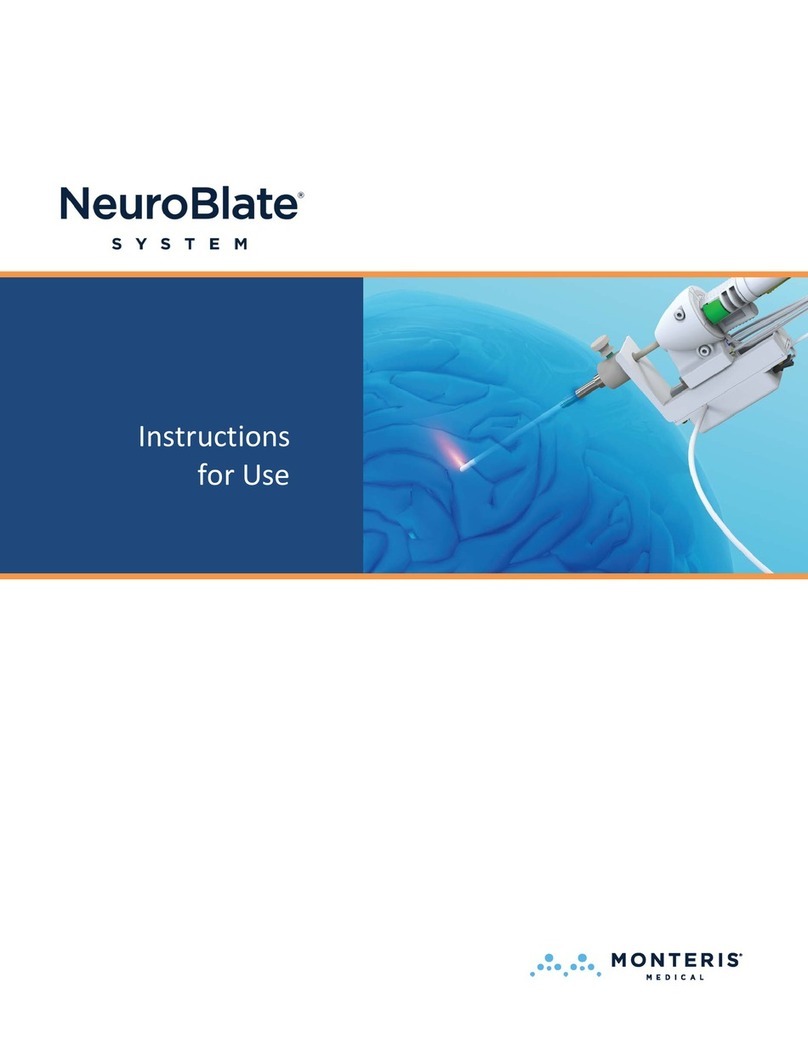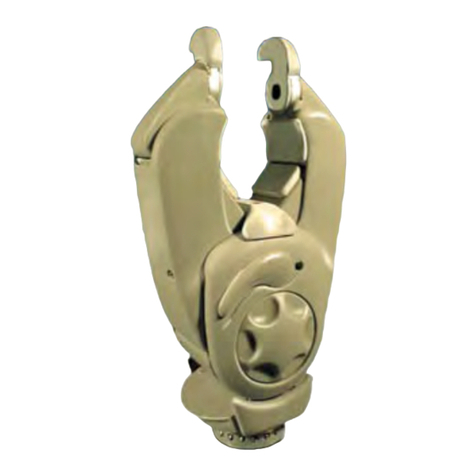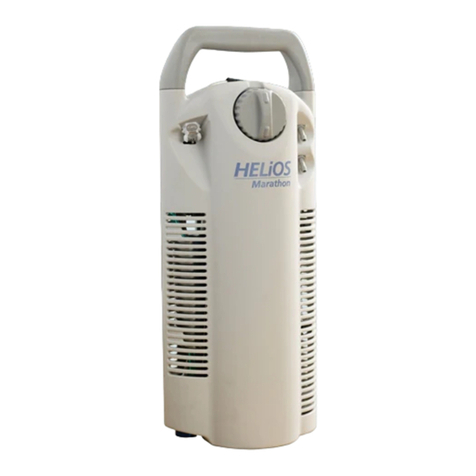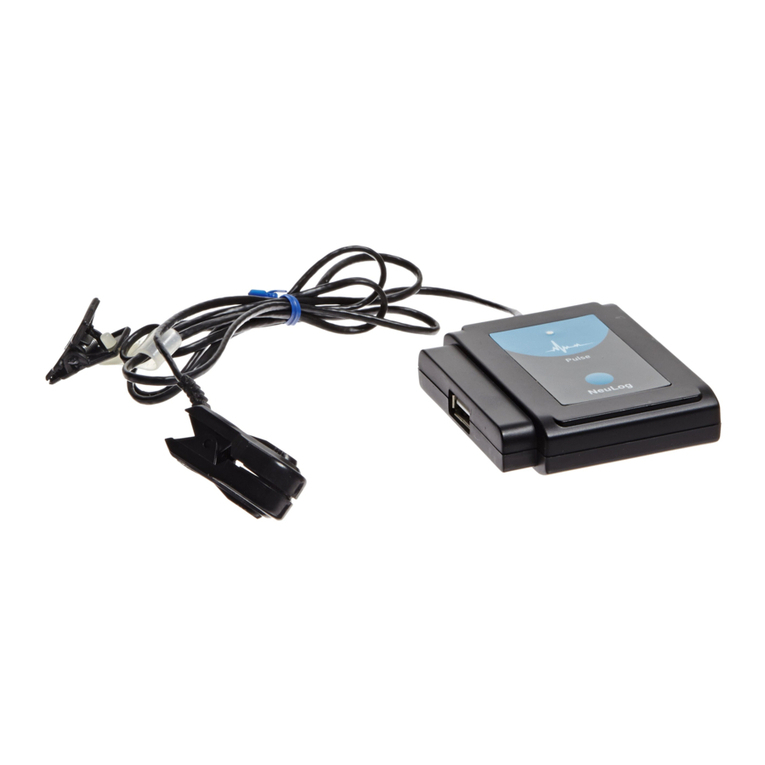BIOMET innerVue II User manual

Operation and Care Manual

InnerVue™II Diagnostic Scope System
IMPORTANT
The InnerVue™II Diagnostic Scope System is indicated to provide illumination
and visualization of anatomy in an interior cavity of the body through a natural
or surgical opening. This device is indicated for diagnostic and operative
arthroscopic and endoscopic procedures. The device is to be used by a trained
physician for the indicated uses only.
This manual describes the recommended procedures for preparing and
operating the InnerVue™II Diagnostic Scope System. It does not describe how
any medical procedure is to be performed on a patient with this instrument.
Read all instructions in this manual carefully before using the InnerVue™II
Diagnostic Scope System.
Carefully follow all safety instructions to prevent injury to the user or patient, re
hazards, electrical shock, and damage to the device.
To maintain this device in optimal condition, follow all recommendations in this
manual for handling, cleaning, and storage.

1
Operation and Care Manual
1
1.0 Introduction
1.1 The InnerVue™II Diagnostic Scope System
1.2 Indications for Use
1.3 Contraindications
1.4 Regulatory Compliance
1.4.1 Electromagnetic Compatibility Chart
1.5 Warranty Information
1.6 How to Use This Manual
1.7 Manual Conventions
1.8 List of Symbols
2.0 Product Specications
2.1 Contents
2.2 Features and Specications
2.2.1 InnerVue™II Diagnostic Scope System Features
2.2.2 Technical Specications
2.3 Safety Information
3.0 Setup and Basic Usage
3.1 Setup
3.1.1 InnerVue™II Diagnostic Scope System
3.1.2 Attaching a Camera System and Endoscope(s)
3.1.3 Attaching External Video Devices
3.1.4 Attaching Virtual Reality Glasses
3.1.5 Setting Up and Operating MediaCaptureUSB
3.2 Basic Usage
3.2.1 Setup for Each Procedure
3.2.2 Power Down Procedures
3.2.3 Single-Use Endoscope Disposal
4.0 Cleaning and Maintenance
4.1 Cleaning of InnerVue™II Diagnostic Scope System
4.2 Sterilization of InnerVue™II Diagnostic Scope System
4.3 Lamp Life Monitoring and Replacement
4.4 Recommendations for the Disposal of the Device
4.5 Fuse Replacement
5.0 Troubleshooting
Table of Contents

2
InnerVue™II Diagnostic Scope System
Thank you for your purchase of the InnerVue™II Diagnostic Scope System. This piece
of equipment is designed and built to give you the latest technology and the
best performance. This manual will help you make the most of your equipment
investment.
1.1 The InnerVue™II Diagnostic Scope System
The InnerVue™II system combines several essential surgical requirements into a
single compact and portable package:
Xenon Fiber Optic Light Source
By employing state-of-the-art lamp power supply technology, a proprietary xenon
arc lamp incorporates an enhanced reflector and delivers near 175-watt
illumination performance for outstanding image quality.
Proprietary High-Resolution Camera System
The camera is a high-resolution 480-line digital camera. It uses a quick-release
optical connector that adapts to wide variety of surgical endoscopes. A
proprietary single cable design eliminates the complexity and cost of the
traditional dual-cable system approach.
Integrated Video Display with Multiple Outputs
The high-resolution 6.4” LCD monitor combines the performance of the Xenon
Fiber Optic Light Source and High Resolution Camera System to deliver a brilliant,
high-resolution video image for clear detail recognition and outstanding color
reproduction.
Multiple Output options on the InnerVue™II Diagnostic Scope System unit allow
you to connect larger external video monitors, video printers, and video recording
devices.
MediaCaptureUSB
A full-featured, fully-integrated image capture system is included in every
InnerVue™II System. Every InnerVue™II System has the capability to capture
video still images, full-resolution video, and audio-tagged still images. Using
the popular CompactFlash®media format, MediaCaptureUSB enables users
to quickly and conveniently document their procedures. Connect directly to a
computer via USB and use the InnerVue™II System to browse captured media or
capture still images and video directly to your practice management software,
running on Windows 2000, Windows XP or Windows Vista.
Camera System: CMAR-01
High-Resolution endoscopic/arthroscopic camera system with integrated light
cable and MediaCaptureUSB capture button.
Introduction

3
Operation and Care Manual
1.2 Indications for Use
The InnerVue™II Diagnostic Scope System is indicated to be used by a trained
physician to provide illumination and visualization of an interior cavity of the
body through a natural or surgical opening in diagnostic and operative arthroscopic
and endoscopic procedures.
1.3 Contraindications
The InnerVue™II Diagnostic Scope System is contraindicated for use in applications
where high intensity light might damage tissue, such as neonate transillumination
and ophtalmic procedures. For other contraindications, consult the literature
accompanying the instrumentation utilized with this device.
1.4 Regulatory Compliance
The InnerVue™II Diagnostic Scope System complies with all regulations to be
marketed in the United States of America, Canada, and the European Union.
This device complies with EN60601-1 and all collateral standards.
This device complies with part 15 of the FCC rules.
This device complies with the Medical Device Directive (Council Directive 93/42/
EEC).
Federal law restricts this device to sale by or on order of a physician licensed by
the law of the state in which he practices to use or order the use of this device.
1.4.1 Electromagnetic Compatibility (IEC 60601-1-2)
Guidance and Manufacturer’s Declaration—Electromagnetic Emissions
The InnerVue™II Diagnostic Scope System is intended for use in electromagnetic environment specied
below. The customer or the user of the InnerVue™II Diagnostic Scope System should assure that it is
used in such an environment.
Emissions Test Compliance Electromagnetic Environment—Guidance
RF Emissions
CISPR 11
Group 1 InnerVue™II Diagnostic Scope System used only energy only for its
internal function. Therefore, its RF emissions are very low and are not
likely to cause any interference in nearby electronic equipment.
RF Emissions
CISPR 11
Class B The InnerVue™II Diagnostic Scope System is suitable for use in all
establishments other than domestic and those directly connected to
the public low-voltage power supply network that supplies buildings
used for domestic purposes.
Harmonic
Emissions
IEC 61000-3-2
Class A
Voltage
Fluctuations/
Flicker
Emissions
IEC 61000-3-3
Complies
Introduction

4
InnerVue™II Diagnostic Scope System
Guidance and Manufacturer’s Declaration—Electromagnetic Immunity
The InnerVue™II Diagnostic Scope System is intended for use in the electromagnetic environment speci-
ed below. The customer or the user of the InnerVue™II Diagnostic Scope System should assure that it is
used in such an environment.
Immunity
Test
IEC 60601 Test
Level
Compliance
Level
Electromagnetic Environment
—Guidance
Electro-
static
Discharge
(ESD) IEC
61000-4-4
+6 kV contact
+8 KV air
+6 kV contact
+8 kV air
Floors should be wood, concrete or ceramic tile.
If oors are covered with synthetic material, the
relative humidity should be at least 30%
Electri-
cal Fast
Transient/
Burst IEC
61000-4-4
+2 kV for power
supply lines
+1 kV for input/
output lines
+2 kV for power
supply lines
+1 kV for input/
output lines
Mains power quality should be that of a typical
commercial or hospital environment.
Voltage
Dips, short
interrup-
tions and
voltage
variations
on power
supply in-
put lines.
IEC 61000-
4-11
<5% UT (95% dip in
UT) for 0,5 cycle
40% UT (60% dip in
UT) for 5 cycles
70% UT (30% dip in
UT) for 25 cycles
<5% UT (>95% dip
in UT) for 5 sec.
100% dip for 0.5
cycles
60% dip for 5
cycles
30% dip for 25
cycles
100% dip for 5
seconds
Mains power quality should be that of a typical
commercial or hospital environment. If the user
of the InnerVue™II Diagnostic Scope System
requires continued operation during power
mains interruptions, it is recommended that
the InnerVue™II Diagnostic System be powered
from an interruptible power supply or a battery.
Power
frequency
(50/60Hz)
magnetic
eld IEC
61000-4-8
3 A/m 3 A/m Power frequency magnetic elds should be at
levels characteristic of a typical location in a
typical commercial or hospital environment.
Note: UT is the ac mains voltage prior to application of the test level.
Introduction

5
Operation and Care Manual
Guidance and Manufacturer’s Declaration—Electromagnetic Immunity
The InnerVue™II Diagnostic Scope System is intended for use in the electromagnetic environment speci-
ed below. The customer or the user of the InnerVue™II Diagnostic Scope System should assure that it is
used in such an environment.
Immunity
Test
IEC 60601 Test
Level
Compliance
Level
Electromagnetic Environment—Guidance
Conducted
RF IEC
61000-4-6
Radiated RF
IEC 61000-
4-3
3 V rms
150 kHz to 80
MHz outside of
ISM bands
10Vrms
150 kHz to 80
MHz in ISM bands
10 V/m
80 MHZ to 2.5
GHz
10 Vrms
10 V/m
Portable and mobile FR communications equip-
ment should be used no closer to any part of the
InnerVue™II Diagnostic Scope System including
cables, than the recommended separation distance
calculated from the equation applicable to the
frequency of the transmitter.
Recommended separaton distance
d = (3.5/3)P
d = (3.5/3)P 80 MHz to 800 MHz
d = (7/3)P 800 MHz to 2.5 GHz
Where P is the maximum output power rating of
the transmitter in watts (W) according to the trans-
mitter manufacturer and dis the recommended
separation distance in meters (m). Field strengths
from xed RF transmitters, as determined by and
electromagnetic site survey,ashould be less than
the compliance level in each frequency range.b
Interference may occur in the vicinity of
equipment marked with the following symbol:
NOTE 1 At 80MHz and 800MHz, the higher frequency range applies.
NOTE 2 These guidelines may not apply in all situations. Electromagnetic propagation is aected by
absorption and reection from structures, objects and people.
aField strengths from xed transmitters, such as base stations for radio (cellular/cordless) telephones
and land mobile radios, amatuer radios, AM and FM radio broadcast and TV broadcast cannot be
predicted theoretically with accuracy. To assess the electromagnetic environment due to xed FR
transmitters, an electromagnetic site survey should be considered. IF the measured eld strength in the
location in which the Xe3000 is used exceeds the applicable FR compliance level above, the InnerVue™II
Diagnostic Scope System should be observed to verify normal operation. If abnormal performance
is observed, additional measures may be necessary, such as reorienting or relocating the InnerVue™II
Diagnostic Scope System.
bOver the frequency range 150 kHz to 80 MHz, eld strengths should be less than 3 V/m.
Introduction

6
InnerVue™II Diagnostic Scope System
Recommended separation distances between portable and mobile RF communications
equipment and the InnerVue™II Diagnostic Scope System
The InnerVue™II Diagnostic Scope System is intended for use in an electromagnetic environment in
which radiated RF disturbances are controlled. The customer or the user of the InnerVue™II System can
help prevent electromagnetic interference by maintaining a minimum distance between portable and
mobile RF communications equipment (transmitters) and the InnerVue™II Diagnostic Scope System as
recommended below, according to the maximum output power of the communications equipment.
Rated maximum
output power of
transmitter (W)
Separation distance according to frequency of the transmitter
150 kHz to 80 MHz 80 MHz to 800 MHz 800 MHz to 2.5 GHz
0.01 0.035 0.035 0.07
0.1 0.11 0.11 0.22
1 0.35 0.35 0.7
10 1.12 1.12 2.21
100 3.5 3.5 7
For transmitters rated at a maximum output power not listed above, the recommended separation distance din meters (m) can be estimated
using the equation applicable to the frequency of the transmitter, where P is the maximum output power rating of the transmitter in watts (W)
according to the transmitter manufacturer.
NOTE 1 At 80 MHz and 800 MHz, the separation distance for the higher frequency range applies
NOTE 2 These guidelines may not apply in all situations. Electromagnetic propagation is aected by absorption and reection from structures,
objects and people.
1.5 Warranty Information
When delivered to the end user in new condition in the original container, the
InnerVue™II Diagnostic Scope System is warranted to be free from defects in
material or workmanship for one year from the date of shipment from Biomet
Sports Medicine to the end user.
Within the above listed time periods, parts that are returned, freight prepaid, to
Biomet Sports Medicine and are determined by Biomet Sports Medicine to be
defective will be repaired or replaced by Biomet Sports Medicine without charge
for parts, labor, or return ground shipping costs. Biomet Sports Medicine will make
every effort to accomplish this repair or replacement within a reasonable time.
After the warranty period, the purchaser must pay all charges for repair and
replacement. This warranty does not cover products intended for single patient use
beyond the initial use or consumable items.
The above actions by Biomet Sports Medicine shall constitute your exclusive
remedy and Biomet Sports Medicine’s sole obligation under this warranty.
Biomet Sports Medicine shall not be responsible for warranty claims made
after the warranty period. To obtain warranty repair service, you must contact
Biomet Sports Medicine to obtain a Return Material Authorization (“RMA”)
number, then return the product, freight prepaid, to Biomet Sports Medicine.
The RMA number and a complete explanation of the problem must be included
with the product being returned to Biomet Sports Medicine for warranty
service. The product to be repaired must be returned in its original box and
packaging, or a similar box and packaging aording an equivalent degree of
protection. Upon completion of repairs, Biomet Sports Medicine will return the
product to the end user, freight prepaid.

7
Operation and Care Manual
The warranty period for replacement parts shall begin upon shipment of same,
but shall in no event exceed the warranty period of the defective part. Biomet
Sports Medicine shall have no liability or obligation for a product that has been
subjected to any of the following:
Failure caused by or attributable to Acts of God, improper use, abuse, negligent
care or handling, accident, faulty installation, improper cleaning, improper
maintenance, or other indications of excess voltage.
This warranty is also void if the product has been repaired or modified
without prior written authorization from Biomet Sports Medicine, if the end-user
has failed to follow the instructions or heed the warnings or specications in the
Operation and Care Manual, or if the product’s serial number has been altered or
removed.
EXCEPT FOR THE FOREGOING WARRANTIES, BIOMET SPORTS MEDICINE HEREBY
DISCLAIMS AND EXCLUDES ALL OTHER WARRANTIES, EXPRESS OR IMPLIED,
INCLUDING BUT NOT LIMITED TO ANY AND/OR ALL IMPLIED WARRANTIES OF
MERCHANTABILITY OR FITNESS FOR A PARTICULAR PURPOSE. BIOMET SPORTS
MEDICINE HEREBY DISCLAIMS ANY REPRESENTATIONS OR WARRANTY THAT
THIS PRODUCT OR ANY OF ITS PARTS IS COMPATIBLE WITH NON-BIOMET SPORTS
MEDICINE PRODUCTS OTHER THAN VIDEO EQUIPMENT ATTACHED TO ITS VIDEO
OUTPUTS, AS DESCRIBED IN THE OPERATOR’S MANUAL. THE LIABILITY OF BIOMET
SPORTS MEDICINE, IF ANY, AND PURCHASER’S SOLE AND EXCLUSIVE REMEDY
FOR DAMAGES FOR ANY CLAIM OF ANY KIND WHATSOEVER, REGARDLESS OF
THE LEGAL THEORY, SHALL NOT BE GREATER IN AMOUNT THAN THE PURCHASE
PRICE OF THE PRODUCT SOLD BY BIOVISION TECHNOLOGIES THAT CAUSED ANY
ALLEGED DAMAGE. IN NO EVENT SHALL BIOMET SPORTS MEDICINE BE LIABLE
TO PURCHASER FOR ANY SPECIAL, INDIRECT, INCIDENTAL, OR CONSEQUENTIAL
DAMAGES OF ANY KIND.
Contact Biomet Sports Medicine for warranty information
800.348.9500
www.biometsportsmedicine.com
Distributed by Biomet Sports Medicine

8
InnerVue™II Diagnostic Scope System
1.6 How to Use This Manual
The intention of this document is to convey the proper and prescribed
operation and care of the InnerVue™II Diagnostic Scope System.
1.7 Manual Conventions
This manual adheres to a set of conventions to help you easily find the
information you need and inform you of important information that will help
you eciently and eectively use your equipment.
Sections and sub-sections are noted as follows:
Special and important information is called out using notes and warnings. Notes
usually pertain to a recommended protocol that will help extend the life of
your equipment. Warnings pertain to protocols that delineate appropriate
actions which maintain a safe and healthy work environment.
Notes and warnings are called out in the following manners:
Note: This is a note.
WARNING: This is a warning.
Section Title
1.1 Sub-section title
Introduction

9
Operation and Care Manual
Hazard Warning. Type BF
Applied Part
Alternating Current Fuse
Storage Humidity Transport Temperature
European CE Mark
PRODUCT SERVICE
TUV, Nationally Recognized
Testing Laboratory (NRTL)
Mark
Federal Communications
Commission Mark
Date of Manufacturing
Attention: Read Operat-
ing Manual for Warnings,
Cautions, Precautions, and
Instructions for Use.
Caution—
High Voltage Caution—Hot
Not Protected Against the
Ingress of Water
1.8 List of Symbols (used in this manual and product labels)
Introduction

10
InnerVue™II Diagnostic Scope System
The following section describes the components and features of the
InnerVue™II Diagnostic Scope System.
2.1 Contents
The following components are included in your InnerVue™Diagnostic Scope
System:
InnerVue™II Diagnostic Scope System Integrated Visualization System (Base Unit)
Medical Grade Power Cord
Operation and Care Manual
CF Card Reader
Check to see that you have all of these components before proceeding. If any of
these components are missing, contact Biomet Sports Medicine immediately
using the contact information below:
Biomet Sports Medicine
56 E. Bell Drive
Warsaw, IN 46582
Phone: 800.348.9500
www.biometsportsmedicine.com
Product Specications

11
Operation and Care Manual
Product Specications
Rear
2.2 Features and Specications
2.2.1 InnerVue™II Diagnostic Scope System Features
Microphone
PS2 Keyboard
Connection
USB Connection
Mode
Delete
Left Select
Right Select
Store/Enter
Power Indicator
Power Button
Speaker
Ventilation
Exhaust
Integrated
LCD Monitor
CompactFlash®Media Slot
Camera Connector
S-Video
Ventilation
Exhaust
VR Connector
Composite Video Fuse Holder Power Connector
KEYPAD

12
InnerVue™II Diagnostic Scope System
Handpiece
Camera POD
Camera
Handpiece
Camera
Connector
Scope
Coupler
Focus Knob
Image Capture
Button
Scope
Cannula
Sliding Sleeve
Scope Probe/Cannula
Luer Fitting/Cannula
Coupler
Scope Handle
Scope
Fiber-optic cable
Specications

13
Operation and Care Manual
Specications
2.2.2 Technical Specications
Electrical
Input voltage: 120/230VAC, 50/60Hz
Input current: 3.0/1.5A maximum.
Power connector: IEC 320
Classication: IEC60601-1 Class I, Type BF equipment
Mode of operation: Continuous
Fuse: 3.15A 250V Type F
Environmental
Operating altitude: -304.8 to 3657.6m(-1000 to 12000 ft) MSL.
Operating temperature: 0ºC to 40ºC (-32ºF to 104ºF).
Operating humidity: 0% to 95% RH, non-condensing.
Storage/transport altitude: -304.8 to 10668m (-1000 to 35000 ft) MSL.
Storage/transport temperature: 0ºC to 50ºC (-32ºF to 122ºF).
Storage/transport humidity: 0% to 95% RH, non-condensing.
Video / Display
Input video format: NTSC Composite, 75Ω, 1Vp-p.
Video output 1: NTSC Composite, 75Ω, BNC.
Video output 2: NTSC Y/C, 75Ω, 4-pin circular DIN.
Video output 3: NTSC Composite, 75Ω, 4-pin VR glasses
connector.
Display type: LCD 16.25 cm (6.4 in) TFT,
active matrix (960Hx 234V)
Light Source
Type: Xenon Arc
Lamp: BL35WXe
Power: 35W
MediaCaptureUSB
Storage media: CompactFlash® Ultra II 15m/s or greater
Still image le format: JPEG
Still image size: 640x480 pixels.
Video le format: AVI (MJPEG codec)
Video size/fram rate: 640 x 480 pixels/15fps.
Compatible Camera Attachments
Needlescope: 922142 100 – 100mm
922180 10˚ 65mm
2.3 Safety Information
General requirements for the safe use of the device:
• It is important that you read, understand, and comply with all of the following
safety precautions, markings, labeling, and all accompanying literature.
• Failure to follow these precautions could result in injury to the patient or user,
or damage to the InnerVue™II unit.

14
InnerVue™II Diagnostic Scope System
Sucient clearance is
maintained by allowing an
area six inches by six inches
both behind and on the left
side of the InnerVue™II unit.
• When used in the presence of other energized, endoscopically-used devices
and accessories, such as Lasers and High Frequency Surgical equipment, the
safety precautions for such equipment must also be followed.
• Before each use, check the outer surface of the arthroscope and arthroscopic
accessories to ensure there are no unintended rough surfaces, sharp edges, or
protrusions that may cause a safety hazard to the patient or user; or cause
damage to the equipment and other accessories.
• In the event of use with other surgical tools, such as shavers, care shall be taken
to avoid damage to the arthroscope or any arthroscopic accessories. All
damaged instruments shall be discarded immediately.
• In the event of a loss of system function during a procedure, no further
visualization is necessary, and the procedure is ended, the physician shall remove
the arthroscope and proceed with closure or further patient care as needed.
Further arthroscopic examination shall only be performed with a fully functional
system, for which a backup unit is recommended.
To avoid personal injury and damage to this device:
• Do not block ventilation slots or openings. Always ensure sucient clearance
for ventilation by not placing any other equipment or objects on or near the
vents on either side of the InnerVue™ Diagnostic unit.
• Always place and keep the InnerVue™II unit on a at, level, and secure surface.
• In the event of suspected damage or failure, DO NOT OPERATE and have the
device inspected by qualied personnel.
A at surface will provide the optimal
performance.
Ventilation
Clearance
6 x 6 inches
Ventilation
Clearance
6 x 6 inches
Specications

15
Operation and Care Manual
Specications
To avoid re hazard and electrical shock:
• Do not operate the device outside of the specied input voltage range.
• Only use medical-grade power cords with the InnerVue™II Diagnostic Scope
System.
• Connect to a properly grounded hospital-grade outlet only.
• Use only the fuse type and rating specied for this device.
• DO NOT operate the InnerVue™II Diagnostic Scope System in an explosive
atmosphere (e.g. in the presence of ammable anesthetics, etc.).
• The InnerVue™ II unit does not have any eld-replaceable parts. DO NOT
disassemble or open the front cover or any other covers or panels. Opening the
front cover will void the manufacturer’s warranty.
• Do not operate this product if there are signs of tampering or any of the covers are
removed.
• Do not allow foreign objects inside of the device.
• Before performing any kind of maintenance (e.g. cleaning the InnerVue™II
Diagnostic Scope System, replacing fuses, etc.), always perform the following:
➲ Unplug the power cord.
➲ Allow unit to cool for at least ten (10) minutes after turning o.
• Do not allow spilling of liquids on the InnerVue™II unit.
• Do not immerse any of the components in liquids.
• Do not operate in wet or damp conditions.
• If any maintenance or repair is needed beyond supercial cleaning or
replacing fuses, contact Biomet Sports Medicine or your authorized service
representative.
Always unplug the power cord if:
• The device has been exposed to moisture, liquids has been spilled on the
device, the device or any of its components have been soaked or immersed in
liquids.
• The device has been dropped.
• The device does not operate properly, the device does not turn on, or the
performance of the device is noticeably dierent.
• The device displays signs of tampering or damage, such as damage to the
power cord, broken enclosures, etc.
WARNING: In the event of use with other energized endoscopically-used
instruments and accessories, the PATIENT LEAKAGE currents may be additive.

16
InnerVue™II Diagnostic Scope System
WARNING: Possible explosion if used in the presence of FLAMMABLE
ANESTHETICS or other EXPLOSIVE GAS MIXTURES.
WARNING: This device is not intended to be used in the presence of HIGH
FREQUENCY SURGICAL EQUIPMENT.
WARNING: This device is not intended to be used in the presence of LASER
EQUIPMENT.
WARNING: Awareness of the possibility of a gas embolism whenever
compressed gases are used in a patient procedure. To minimize the risk, you
must verify that adequate space exists for the egress of any patient applied
gases.
WARNING: USB connector is never to be used when the device is in contact
with a patient.
WARNING: The lamp and reector are not intended for eld replacement.
Attempts to service or replace the lamp may result in injury or damage to the
device, and void the warranty.
WARNING: Do not look directly into the light emitting windows of the
endoscope or handpiece. This may result in eye damage.
WARNING: After removing the endoscope, do not touch the light emitting
window of the handpiece or the light receiving window of the endoscope. They
may become hot after long periods of use.
WARNING: Do not touch the light receiving port of the handpiece upon
disconnection. The tip of the port may become hot after long periods of use.
WARNING: DO NOT IMMERSE the camera handpiece in liquids of any kind,
personal injury or damage to the device may result.
To avoid electromagnetic interference:
• Special precautions are required regarding the electromagnetic compatibility (EMC) of the
InnerVue™Diagnostic Scope System. The system needs to be installed and put into service
according to the EMC information provided in this manual.
• Portable and mobile radio frequency (RF) communications equipment can aect any medical
electrical equipment including the system.
• Only cables and accessories provided by the manufacturer may be used with the system.
The use of any other cables or accessories may have an adverse eect in the electroagnetic
compatibility of the device such as increased emissions or decreased immunity.
• This device should not be used adjacent to or stacked with other equipment. Should use
adjacent to other equipment become necessary the system should be observed to verify
normal operation in that conguration.
Specications

17
Operation and Care Manual
“Additional equipment connected to medical electrical equipment must comply with
the respective IEC or ISO standards (e.g. IEC 60950 for data processing equipment).
Furthermore, all congurations shall comply with the requirements for medical electrical
systems (see IEC 60601-1-1 or clause 16 of the 3Ed. of IEC 60601-1, respectively).
Anybody connecting additional equipment to medical electrical equipment congures
a medical system and is therefore responsible that the system complies with the
requirements for medical electrical systems. Attention is drawn to the fact that local
laws take priority over the above mentioned requirements. If in doubt, consult your
local representative or the technical service department.”
“Zusätzliche Geräte, die an medizinische elektrische Geräte angeschlossen werden,
müssen nachweisbar ihren entsprechenden IEC oder ISO Normen entsprechen (z.B.
IEC 60950 für datenverarbeitende Geräte). Weiterhin müssen alle Kongurationen den
normativen Anforderungen für medizinische Systeme entsprechen (siehe IEC 60601-
1-1 oder Abschnitt 16 der 3. Ausgabe der IEC 60601-1, jeweilig). Wer zusätzliche Geräte
an medizinische elektrische Geräte anschließt ist Systemkongurierer und ist damit
verantwortlich, dass das System mit den normativen Anforderungen für Systeme
übereinstimmt. Es wird darauf hingewiesen, dass lokale Gesetze gegenüber obigen
normativen Anforderungen Vorrang haben. Bei Rückfragen kontaktieren Sie bitte Ihren
örtlichen Fachhändler oder den Technischen Dienst.”
Specications

18
InnerVue™II Diagnostic Scope System
Setup and Basic Usage
The following section describes how to set up and use the InnerVue™II Diagnostic
Scope System for surgical procedures.
3.1 Setup
Proper initial setup is essential to provide you
and your sta the best access to operational
and visual performance while conducting procedures.
3.1.1 InnerVue™II Diagnostic Scope System
For best performance, always operate and keep the
InnerVue™II unit on a at, level, and secure surface.
Images on the Integrated Video Display are best
viewed at an angle perpendicular to the display.
Do not tilt the InnerVue™II unit. For better viewing,
adjust the height and display angle.
3.1.2 Attaching a Camera Handpiece and
Arthroscope
The InnerVue™II camera handpieces attach via
a combination fiberoptic/electric connector. This
connector seats in the receptacle on the front of the
unit (See also: § 2.2.1 Front).
Before connecting a camera handpiece to the InnerVue™ II unit, the camera or
handpiece must be properly cleaned.
Note: For best image quality and to ensure patient safety, verify that both ends of
the camera or handpiece are free of foreign particles.
Connecting the scope and
handpiece to the InnerVue™ II
unit: Align the colored dot on the
handpiece connector with the
matching dot on the input port of
the video box. Once the dots are
aligned, insert the optical plug into
the input port.
Adjust display up/down for
Optimal Viewing Angle
Swivel display side-to-side
for Optimal Viewing Angle
Table of contents
Other BIOMET Medical Equipment manuals
Popular Medical Equipment manuals by other brands
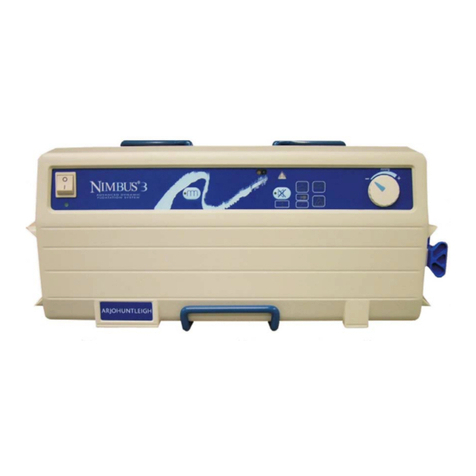
Getinge
Getinge Arjohuntleigh Nimbus 3 Professional Instructions for use

Mettler Electronics
Mettler Electronics Sonicator 730 Maintenance manual
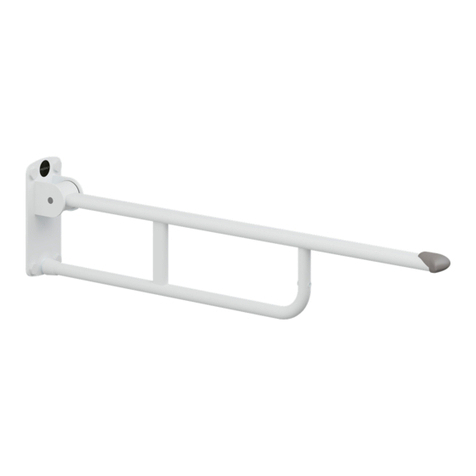
Pressalit Care
Pressalit Care R1100 Mounting instruction
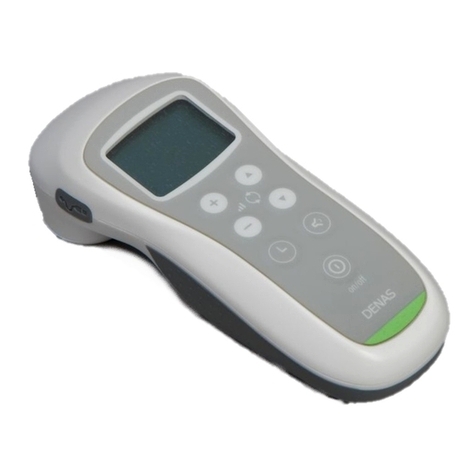
Denas MS
Denas MS DENAS-T operating manual
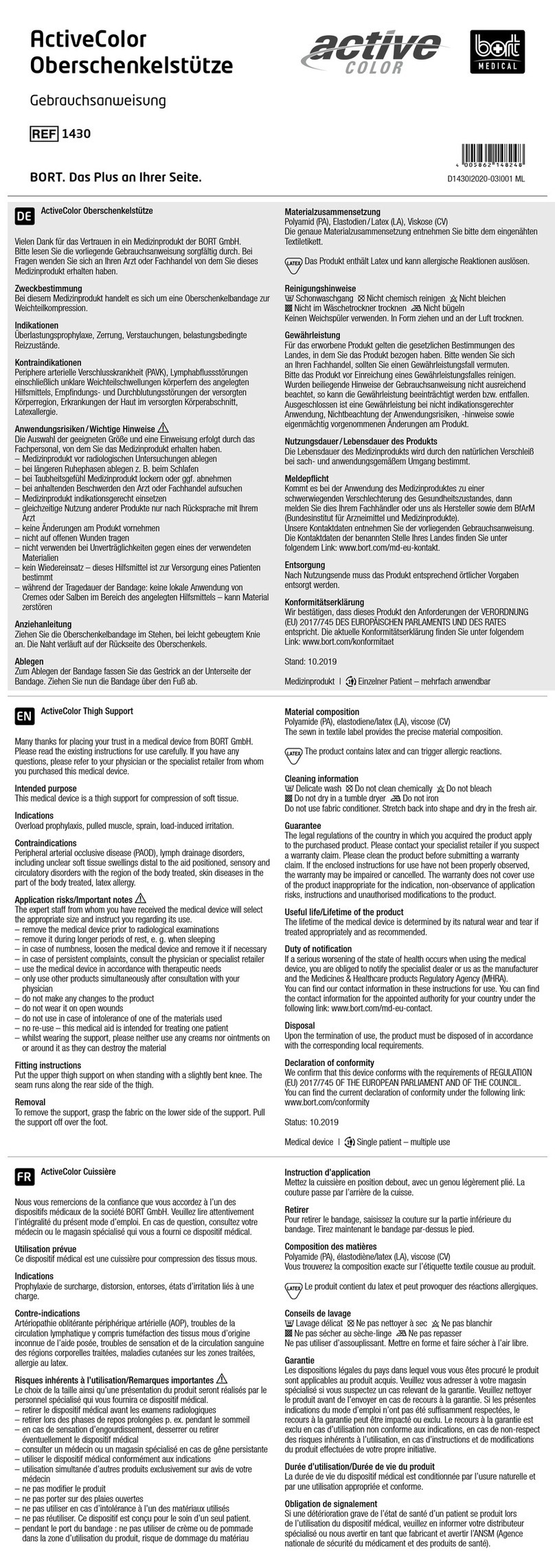
bort medical
bort medical ActiveColor quick guide
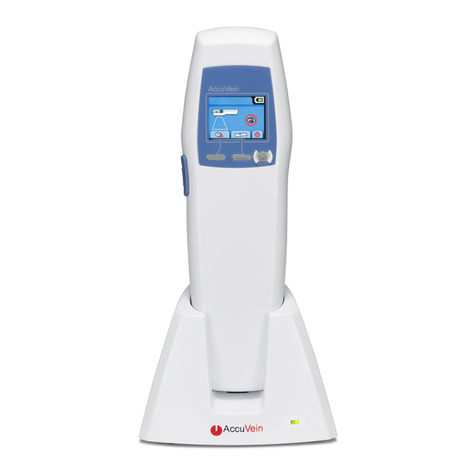
AccuVein
AccuVein AV400 user manual
